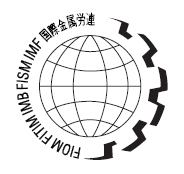
The United Nations Economic Commission for Europe is one of the five regional commissions under the jurisdiction of the United Nations Economic and Social Council. It was established in order to promote economic cooperation and integration among its member states.

The World Federation of Trade Unions (WFTU) is an international federation of trade unions established in 1945. Founded in the immediate aftermath of World War Two, the organization built on the pre-war legacy of the International Federation of Trade Unions as a single structure for trade unions world-wide, following the World Trade Union Conference in London, United Kingdom.

The Scottish Trades Union Congress (STUC) is the national trade union centre in Scotland. With 40 affiliated unions as of 2020, the STUC represents over 540,000 trade unionists.

The International Federation of Journalists (IFJ) is the largest global union federation of journalists' trade unions in the world. It represents more than 600,000 media workers from 187 organisations in 146 countries.
Education International (EI) is a global union federation (GUF) of teachers' trade unions consisting of 383 member organizations in 178 countries and territories that represents over 32 million education teachers and education support personnel from pre-school through university. It is one of the world's largest sectoral global union federations.

The International Transport Workers' Federation (ITF) is a democratic global union federation of transport workers' trade unions, founded in 1896. In 2017 the ITF had 677 member organizations in 149 countries, representing a combined membership of 19.7 million transport workers in all industrial transport sectors: civil aviation, dockers, inland navigation, seafarers, road transport, railways, fisheries, urban transport and tourism. The ITF represents the interests of transport workers' unions in bodies that take decisions affecting jobs, employment conditions or safety in the transport industry.

The International Metalworkers' Federation (IMF) was a global union federation of metalworkers' trade unions, founded in Zürich, Switzerland in August 1893. As of 2009, the IMF had more than 200 member organisations in 100 countries, representing a combined membership of 25 million workers.

The International Federation of Chemical, Energy, Mine and General Workers' Unions (ICEM) was a global union federation of trade unions. As of November 2007, ICEM represented 467 industrial trade unions in 132 countries, claiming a membership of over 20 million workers.

The International Federation of Building and Wood Workers (IFBWW) was a global union federation of trade unions in the building, building materials, wood, forestry and allied industries.

The International Textile, Garment and Leather Workers' Federation (ITGLWF) was a global union federation. In 2005 it had 217 member organizations in 110 countries, representing a combined membership of over 10 million workers.
The International Federation for Human Rights is a non-governmental federation for human rights organizations. Founded in 1922, FIDH is the third oldest international human rights organization worldwide after Anti-Slavery International and Save the Children. As of 2020, the organization is made up of a federation of 192 organizations from 112 countries, including Israel and Palestine, including Ligue des droits de l'homme in over 100 countries.

The International Trade Union Confederation (ITUC) is the world's largest trade union federation.
The Labor Council for Latin American Advancement (LCLAA) is a nonprofit, nonpartisan Latino organization affiliated with the AFL-CIO and the Change to Win federation. It was founded in 1972 to provide Latino trade union members in the United States with a more effective voice within the AFL-CIO, to encourage Latino participation in the democratic process, and to encourage the organization of Latino workers into labor unions.
The Global Labour University (GLU) is an international network of universities, trade unions, NGOs and the International Labour Organisation. It was initiated in 2002 and offers master's programs, academic certificate programs and Massive Open Online Courses (MOOC) on sustainable development, social justice, international labour standards and trade/labour unions, economic policies and global institutions.
The International Organisation of Employers (IOE) was created in 1920 to advocate for employers and the business community in the tripartite governance structure of the International Labour Organization (ILO). Today, from its headquarters in Geneva, Switzerland, IOE continues to defend and promote these same interests across a wide range of UN agencies, international organisations, intergovernmental processes and the media. As of September 2019, IOE had 156 national employer organisations members in 145 countries. It remains involved in the activities of the International Labour Organization, acting as Secretariat to the Employers' Group, as well as representing business in international forums, including the G20 intergovernmental process on labour and social policy. It describes itself as "the largest network of the private sector in the world" and "the global voice of business".

The International Federation of Trade Unions was an international organization of trade unions, existing between 1919 and 1945. IFTU had its roots in the pre-war IFTU.
The International Hospital Federation (IHF) is an independent, not-for-profit, non-governmental organization based in Bernex, Switzerland. The IHF is a global association for healthcare management that assists healthcare organizations and facilities in improving their performance by implementing initiatives that enhance their responsiveness, efficiency, accessibility, and quality in meeting the healthcare requirements of people all over the world. The IHF also provides a platform for the global healthcare community to share knowledge, ideas, and experiences, as well as identify international partnerships and collaboration opportunities. Furthermore, the Federation encourages the creation of new national hospital organizations in order to include as many countries as possible in their activities, particularly emerging and developing nations, and to grow their network.
The South African Congress of Trade Unions (SACTU) was a national trade union federation in South Africa.
The World Federation for the Metallurgic Industry was a global union federation representing workers in the metalworking industry.











